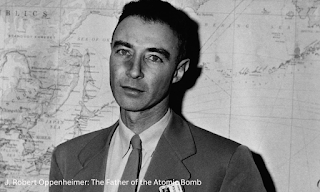J. Robert Oppenheimer: The Father of the Atomic Bomb
Early Life and Education
It seems like you are referring to J. Robert Oppenheimer, a renowned American physicist who played a crucial role in developing the atomic bomb during World War II. Here's a brief history of J. Robert Oppenheimer: J. Robert Oppenheimer, full name Julius Robert Oppenheimer, was born on April 22, 1904, in New York City, United States. He came from a wealthy family and showed early signs of brilliance. He attended the Ethical Culture School in New York City and later studied at Harvard College, where he excelled in literature and languages. However, he eventually developed a strong interest in physics.
The Rise of a Brilliant Physicist
After completing his undergraduate studies, Oppenheimer pursued a Ph.D. in physics at the University of Göttingen in Germany, which was a center of excellence in theoretical physics at that time. There, he worked with renowned physicists like Max Born and Werner Heisenberg. He completed his doctorate in 1927 with a thesis on quantum mechanics.
The Manhattan Project
Upon returning to the United States, Oppenheimer became a professor of physics at the University of California, Berkeley, where he made significant contributions to theoretical physics and quantum mechanics. He became a prominent figure in the scientific community and was well-respected for his intellect and leadership.
Trinity Test: Unleashing Atomic Power
Oppenheimer was appointed as the scientific director during World War II as the Manhattan Project was initiated in 1942. This highly secretive and ambitious project aimed to develop an atomic bomb before Nazi Germany could acquire such a devastating weapon. Under Oppenheimer's guidance, the project made remarkable progress, culminating in the successful test of the first atomic bomb on July 16, 1945, in New Mexico. The test was code-named "Trinity."
Post-War Advocacy
Oppenheimer's role in the development of the nuclear bomb made him a celebrated figure, but it also put him in the spotlight. After the war, he became an advocate for international control of nuclear weapons and urged for civilian control of atomic energy.
Controversy and Security Clearance Revocation
However, the situation changed drastically during the early years of the Cold War. Concerns about nuclear proliferation and the emerging Soviet nuclear threat led to heightened security measures and investigations of scientists involved in the Manhattan Project. Oppenheimer's past associations with communist sympathizers, even though he was not a member of the Communist Party, came under scrutiny. This led to his security clearance being revoked in 1954, which effectively ended his direct involvement in government science and policy.
Academic Pursuits and Legacy
Despite the controversy surrounding his security clearance, Oppenheimer continued his academic work and teaching career. He became a professor at the Institute for Advanced Study in Princeton, New Jersey, where he remained until his retirement in 1966.
The Final Chapter
J. Robert Oppenheimer's contributions to science and his pivotal role in the development of the atomic bomb are enduring parts of his legacy. He passed away on February 18, 1967, leaving behind a complex and impactful history in both the scientific and political spheres.


.png)
.png)
.png)
.png)
.png)




0 Comments
If you want me to publish history that you like so tell me freely...